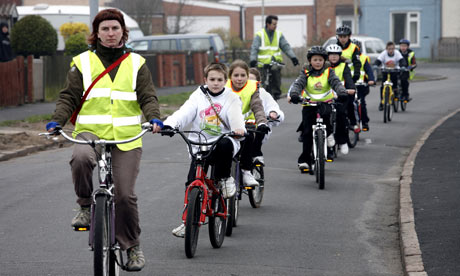
Students are coached for the cycling proficiency test known as Bikeability at Queens Mead Primary School, Braunstone, Leicestershire. Photograph: David Sillitoe
Significant numbers of children face active official discouragement and even bans against cycling to and from school, cycle campaigners have warned as a new academic year gets under way.
As state pupils in most of the UK returned for the new term over the past week – those in Scotland went back earlier – most travelled to school in cars, on buses or on foot. Just a tiny minority did so on a bicycle, despite rising levels of obesity and inactivity.
Many would actively like to ride but are prevented from doing so by a mixture of parental worries and school policies which range from warnings about safety to effective bans through a refusal to allow bikes to be kept on school grounds, campaigners say.
Debra Rolfe from CTC, the UK's biggest cycling campaign group, said: "It's very hard to say exactly how big a problem this is. We often get contacted by parents raising this as an issue, but they don't want to make too much of a fuss because their children aren't keen on standing out.".
The issue appears to be most acute in primary schools, some of which refuse outright to allow pupils to travel by bike even though most generally live within a radius of a mile or so.
Sam O'Shea, now 11, has become a reluctant local cause celebre in Portsmouth, Hampshire, after his school refused to let him ride, even though he was a keen weekend cyclist who had passed the government's new cycling proficiency test, known as Bikeability. His mother, Angela, spent months arguing that Sam's one-mile journey to St Paul's primary school, nearly all on cycle paths, was safe, a view supported by an official risk assessment. Even after she successfully petitioned the council to convert the narrow road outside the school to one way traffic the headteacher and governors refused to budge.
"Whatever objections they came up with we provided a solution, but then they'd move the goalposts again. It soon became clear that they just weren't interested," she said. "The best they could offer was that I would drive behind him and take the bike home when he arrived, and then come back with the bike in the afternoon. It was crazy."
In response to such cases the CTC has produced a Right to Ride to School leaflet for the start of the new academic year, noting that schools cannot issue outright cycling bans and advising parents how to lobby.
"In some schools it can just be a waste of time," said one senior official involved in government efforts to promote cycling, speaking anonymously. "They start off sounding interested, but then you meet the headteacher and he says, 'Well, my niece was knocked off her bike and it's clearly too dangerous. I'm not having my pupils cycling.'"
Other schools openly state that cycling is discouraged due to safety, said the CTC's Rolfe, while others provide nowhere secure for bikes to be stored. "A lot of bike sheds have disappeared over the year. It's difficult to pin down statistics but that seems to be the case."
The paradox is that this battle is taking place while the Westminster is spending tens of millions of pounds a year sending so-called cycling champions into schools to encourage the practice, while helping to fund Bikeability courses. The bike advisers are now working in more than 400 English schools through a scheme run by Cycling England, a body funded by the Department for Transport.
"It's not a quick fix. The hope is that it becomes a virtuous spiral – as more and more people cycle, more children will be encouraged to take it up," said Phillip Darnton, the chairman of Cycling England. At present, he said, well under 1% of primary school pupils ride to work with about 2% doing so in secondary schools, figures Darnton concedes is "pathetic".
His organisation has warned the government that without official intervention there could be a "lost generation" who never experience cycling: "If you look at parents who are, say, aged 22 to 35, many of them haven't really ridden bikes. If their child has a bike they don't know how to mend a puncture, or adjust the brakes, they don't know the right height for a saddle. They can't teach their children."
Meanwhile in Denmark...
For Mikael Colville-Andersen, taking seven-year-old Felix and Lulu, nearly two, to their school and adjoining playgroup in Copenhagen is simplicity itself.
"Sometimes he'll ride on his bike and I'll take her on mine, sometimes I carry them both on a cargo bike," says Colville-Andersen, who writes a series of cycling blogs from the Danish capital. "It's completely normal, everybody does it. There are bike lanes everywhere. If I look out of my window now I can see maybe 100 cyclists."
His children, like all others in Denmark, will receive comprehensive bike safety training before leaving primary school. "It's in the curriculum and it's in the culture, and it has been for many years."
Cycling England's Darnton, however,
fears that comparisons with such countries is "not terribly helpful"
due to the amount of work still needed in the UK: "I once asked a
European official how we could copy what they had done and he said,
'Start a long time ago.'"
From Guardian.co.uk
